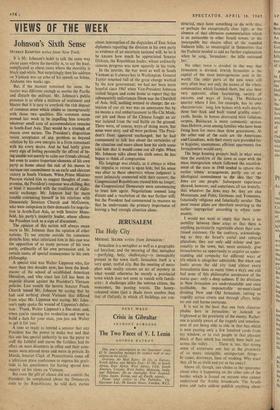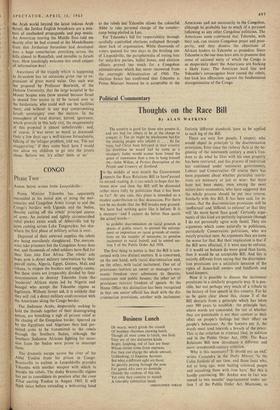MICHAEL SELZER writes from Jerusalem: Jerusalem is a metaphor as
well as a geographi- cal location; and the meaning of that metaphor --purifying, holy, challenging—is inescapably present in the town itself. Jerusalem itself is a very quiet, restful city. But the meeting of meta- phor with reality creates an air of mystery in what would otherwise be merely a provincial town which does not seem to vanish with famili- arity: it challenges alike the veteran citizen, the newcomer, the passing tourist. The honey- coloured stone (just a shade more sombre than that of Oxford), in which all buildings are con- structed, may have something to do with this: or perhaps the exceptionally clear light; or the absence of that obtrusive commercialism which is so noticeable in other Israeli towns: or the inescapable but elusive effect of the rounded Judaean hills, so meaningful in themselves that the Psalmist needed to add no further explanation when he sang. 'Jerusalem: the hills surround her.'
No other town is divided in the way that Jerusalem is divided. Jewish Jerusalem is the capital of the most heterogeneous state in the world. I he older parts of the new town still. very often bear not only the names ot the ethnic communities which founded them, but also their very apparent, often fascinating, variety of customs and ways of living. The Buk haran quarter where I live, for example, has its own characteristic: long, low houses with walls nearly three feet thick and built round grubby court- yards. Inside, in homes decorated with fabulous carpets. Bukharan is more commonly spoken than Hebrew, even among families who have been living here for more than three generations. At the other end of the scale are the Americans and Canadians, with their every care provided for in hygienic, anonymous, efficient apartments few Jerusalemites would envy.
The huge housing projects built in what were then the outskirts of the town to cope with the mass immigration which followed the establish- ment of the state in 1948 tended to ignore this earlier 'ethnic' arrangement, partly out of an ideological commitment to the idea that 'the Jews are one people.' Subsequent experience showed, however, and sometimes all too brutally, that whatever the Jews may be, they are also Moroccans and Poles, Germans and Yemenites, fanatically religious and fanatically secular. The most recent plans are therefore reverting to the earlier 'segregation' according to ethnic com- munity.
I would not want to imply that there is no mobility between these areas or that there is anything particularly regrettable about their con- tinued existence. On the contrary, acknowledg- ing as they do Israel's social and cultural pluralism, they not only add colour and per- sonality to the town, but, more seriously, give Jerusalemites an opportunity to acquire an under- standing and sympathy for different ways of life which is altogether admirable. But when one looks across the old city (and almost every Jerusalemite does so many times a day), one can feel none of this philosophic acceptance of the status quo: only a deep sadness. If the divisions in New Jerusalem are understandable and even justifiable, the impenetrable no-man's-land dividing New and Old Jerusalem, cutting so stupidly across streets and through alleys, helps no one and harms everyone.
It is not in the least that one feels claustro- phobic here in Jerusalem; or isolated: or frightened at the proximity of the enemy. Rather, one is acutely aware of the tragedy and senseless- ness of not being able to ride in that bus which is now passing only a few hundred yards from my window, or to visit people in that pleasant block of flats which has recently been built just across the valley. . . . There is, too, that strong
sense of unfairness one has at the proximity of so many intangible, unimportant things-- fir cones, doorways, lines of washing. Why must they all be so vivid and yet so far away?
Above all, though, one chides at the ignorance about what is happening on the other side of the border which is forced on anyone who cannot understand the Arabic broadcasts. The Israeli press and radio seldom publish anything about
the Arab world beyond the latest tedious Arab threat; the Jordan English broadcasts are a mix- ture of unabashed propaganda and pop music.
;. An American touring the Middle East-told me . shortly after he had crossed at the Mandelbaum• Gate that Jordanian Jerusalem had developed into a huge conurbation stretching across the hills almost to Ramallah, and invisible to Israeli eyes. How touchingly welcome this small snippet of information was!
Awareness of the tragedy which is happening to Jerusalem has on occasions given rise to ex- pressions of great moral value. One such was the proposal by Professor Bentwich, of the Hebrew University, that the large hospital in the Mount Scopus area (now unused because Israel
, is denied free access to it) be turned over to the Jordanians, who could well use the facilities there, and without in any way compromising Israeli sovereignty over the enclave. In the atmosphere of total distrust, hatred, ignorance, iIwhich prevails in this holy city, the magnanimity Is of this proposal is almost unbelievable: and, ''." of course, it was never so much as discussed. I Only a few days ago a well-known Jerusalemite, i talking of the refugee problem, told me, I'm not '' exaggerating: if they come back here I would not allow my children to go into the streets alone. Believe me, it's either them or us.'































 Previous page
Previous page